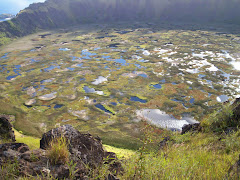 Global warming’s dark twin, ocean acidification, is
disrupting life in the oceans as dangerously as warming itself.
Global warming’s dark twin, ocean acidification, is
disrupting life in the oceans as dangerously as warming itself.THE source of news about science and the environment as they relate to the Hawaiian Islands, hosted by veteran science reporter Jan TenBruggencate. Issues covered include archaeology, astronomy, botany, climate science, conservation, efficient transportation, geology, marine sciences, sustainability and zoology, with occasional forays into other areas, including traditional navigation and canoe voyaging.
 Global warming’s dark twin, ocean acidification, is
disrupting life in the oceans as dangerously as warming itself.
Global warming’s dark twin, ocean acidification, is
disrupting life in the oceans as dangerously as warming itself.Posted by Jan T at 10:13 AM
Labels: Botany, Climate Change, Fisheries, Geology, Marine Issues, Oceanography, Reefs, Zoology


Raising Islands.
I borrow the name of this blog, gratefully and with permission, from my friend Nainoa Thompson. He uses the term “raising islands out of the sea” to create in the mind the experience of a voyaging canoe coming up on a distant shore, and of watching distant peaks rise out of the sea as the canoe approaches.
The first time I did it with him, our vehicle was the voyaging canoe Hokule'a and the island was Nihoa. I recall the crew's thrill at dawn, seeing the twin peaks of the island appear, and then the saddle between them, and finally the whole island. Thompson was the non-instrument navigator who had brought us there using only stars, clouds, wind, seas, birds and other cues.
The name of this blog also invokes the idea of responsibility—raising as lifting up, as caring for and conserving.
The key to responsibility is understanding. If we are to care for these islands, we need the kind of understanding of the environment that a traditional navigator needs.

No comments:
Post a Comment